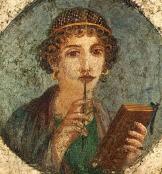Fembio Specials Famous Women Poets Sappho
Fembio Special: Famous Women Poets
Sappho

born around 612 BCE in Mytilene or Eressos (Lesbos)
died around 557 BCE on the island of Lesbos
Greek poet
Biography
“Sappho's poems are a powerful challenge to the widespread notion of a monolithic phallic economy and to the triumph of unfettered masculine subjectivity throughout Western culture. Sappho celebrates neither housework nor fertility nor the role of the good wife, but rather the memory of and longing for the absent beloved, the love and lust that women share on soft beds. We ... cannot write the history of sexuality without Sappho. We must come to terms with this woman who shakes the foundations of Western culture and the history of sexuality, ... with this woman who speaks of her desire.” (Page Dubois, 1995)
Little is known about the life of the most famous female poet of the Western world. She was born around 612 BC on the Greek island of Lesbos, not far from the coast of Asia Minor (now Turkey). The aristocrat moved in a circle of girls and young women – perhaps friends, perhaps students, perhaps both, or perhaps followers of a cult of Aphrodite. She was said to have had a daughter named Cleis. But maybe Cleis was actually a young lover – it depends on how we choose to interpret the Greek word pais = 'child.' In the following version, the translator of the poem into English chose ‘daughter’:
Sleep, darling
I have a small
daughter called
Cleis, who is
like a golden
flower
I wouldn't
take all Croesus'
kingdom with love
thrown in, for her
(translation Barnard)
Sappho's fame is based on the unanimous testimony of ancient authors, who knew far more of her work than has survived through the ages. Today we only have a single completely preserved poem and a series of fragments – only 40 of which are longer than a few words. Even today it is their freshness and immediacy of tone as well as their passion and intimacy that make these fragments “the epitome of lyricism.” In what is probably her most famous poem, Sappho described with clinical precision the physical symptoms of consuming jealousy and desire:
He seems to me equal to the gods that man
whoever he is who opposite you
sits and listens close
to your sweet speaking
and lovely laughing — oh it
puts the heart in my chest on wings
for when I look at you, even a moment, no speaking
is left in me
no: tongue breaks and thin
fire is racing under skin
and in eyes no sight and drumming
fills ears
and cold sweat holds me and shaking
grips me all, greener than grass
I am and dead — or almost
(Fragment 31, translated by Anne Carson)
The classicist Page Dubois sees in Sappho not only a brilliant poet, but also a previously undiscovered philosopher. Based on fragment 16, in which Sappho states that the most beautiful thing on the dark earth is not a band of horsemen or the like, but rather what one loves, Dubois rightly asks: “What would the history of philosophy look like if we placed Sappho at its beginning?”
(Text from 2008, translated with DeepL.com; edited by Ramona Fararo, 2024.
Please consult the German version for additional information, pictures, sources, videos, and bibliography.)
Author: Luise F. Pusch
Quotes
Of the Beloved
after Sappho (translated from German)
Gods resembles the one who, sitting close to you,
may hear your voice, resting beside you,
sucking in the sweet sound, and in the laughter, this
laughter of longing,
I see the tender intimacies:
palpitations and numbness of the voice –
only madness in me; my words are silent
when I see you.
You – my voice breaks, my tongue dry,
glowing, as if struck by the finest flames,
I go black, and a rushing sound
deafens me.
My body is drenched in sweat, and the trembling of all
my limbs is like the trembling of grass, dry
dead grass in the wind. I am pale – I resemble
almost a corpse.
I understand what you are doing, my dear, I endure it…
– – – – –
Siegfried Carl
If you hold the rights to one or more of the images on this page and object to its/their appearance here, please contact Fembio.


